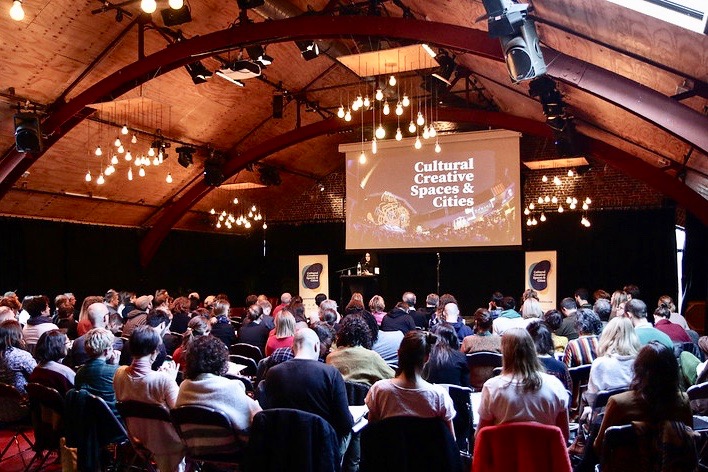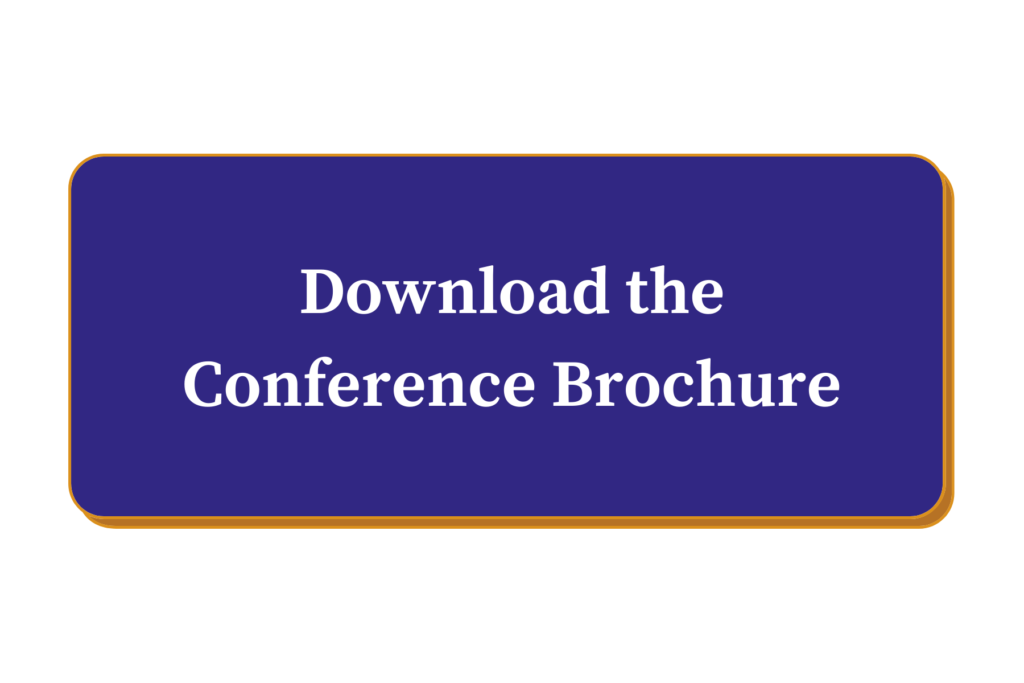Co-designing Our Cities Conference

Cultural Spaces as Homes for Democracy
About the event
This is no ordinary conference! The Co-designing Our Cities Conference marked the culmination of a 2.5-year experimental project which has developed new ways for cities and regions to bring together the public administration and the cultural sector to co-create public policies. Cultural Creative Spaces and Cities (CCSC) shows that culture and commoning practices can transform neighbourhoods and cities into more sustainable places, catalysing better lives for their communities.
The results and Outputs of the entire project were presented to over 800 online participants watching from 67 different countries during this two-day digital event.
Brought together by a consortium of ten forward-looking organisations, dozens of stakeholders across Europe have explored how participatory governance and commoning practices can devise a more sustainable future for Europe.
Watch the Conference recordings.
If you would like to re-watch any of the presentations, the Conference video recordings are available to watch on Trans Europe Halles Vimeo.
Explore the channel here or visit the Media page.
Culture has the power to impact people’s lives.
Participatory governance is a people-centred approach to deepen citizen engagement in governmental decision-making. Participatory processes facilitate communication and relations between public institutions and civil society, resulting in a better quality of democracy. Participatory governance is one of the top priorities in the EU’s cultural agenda for the upcoming years.
Participatory governance empowers people to decide their future.
Commoning processes attempt to activate the power of social cooperation to make things happen. In this project, we think of commoning as a variety of collective actions enabling interaction between actors in the cultural sector. Their joint efforts intend to shape new institutional arrangements safeguarding the sustainability of creative work.
Urban Labs
Urban Labs are the core component of this project. They gather together cultural organisations, local authorities, cultural and creative spaces to explore urban challenges in collaboration with other stakeholders. Together, they commit to developing innovative solutions.
During the event:
- 45+ speakers shared inspiring case studies of commoning, and thoughts on the future of co-creating public policy from both grassroots, local, regional and European levels.
- 7 Participatory workshops testing out some of the policy co-creation methodologies and learnings developed by the CCSC project partners.
- Presentations, debates, and Q&A sessions on the publications for future participatory policy-making and commons practice. From the researchers of the CCSC projects.
- A first look at the Outputs developed from this project. Benchmarking platform – artsmetric, Online Toolkit, and Map of Space.
Programme
Wednesday 3 February 2021 – 09:00 – 13:00 (CET)
Welcome by Mieke Renders, (Managing Director of Trans Europe Halles), Ola Jacobson, (Executive Officer of CCI & International Affairs from Region Scania Culture Department, Sweden) and Barbara Stacher (Cultural Policy Officer – European Commission). Moderator: Jose Luis Rodriguez (Trans Europe Halles). Watch recording here.
09.10 CCSC Background and Outputs by Asma Mansour – CCSC Project Manager (Trans Europe Halles). Watching recording here.
09.25 Inspirational Keynote address. Speakers: Gabriella Riccio (Artist, activist and researcher, based in Madrid and Naples) with Michela Magas (Chair of the Industry Commons Foundation) Moderator: Jose Luis Rodriguez (Trans Europe Halles). Watch recording here.
10.10 CCSC Urban Labs journey panel
With Andreaa Iager (AMBASADA, Romania), Katarina Scott (Lund Municipality, Sweden), Kai Huotari (Kaapeli, Finland), Ola Jacobson (Region of Scania, Sweden), Zuzana Révészová (Creative Industries Kosice, Slovakia), Flavia Introzzi (Hablarenarte, Spain), Elena Lasala (Hablarenarte, Spain) Sergi Frías (Coboi Lab, Spain) Moderator: Marieke Maertens (Timelab, Belgium). Watch recording here.
During this session Marieke Maertens from Timelab converses with the Urban Labs about their CCSC journey. 7 Urban Labs (UL) are at the core of the CCSC project. They each explore different urban challenges in collaboration with other stakeholders. Together, they committed to developing innovative solutions. We listen to them to find out what they learnt and how they envision the next steps. In the conversation we come back to the used methodology of the researchers concerning the developed indicators, peer learning workshops and the shared challenges between the Urban Labs. We discuss how each UL did or did not achieve their predefined goals or adapted the plans due to COVID-19.
11.10 Coffee break
11.20 Book Launch and debate Commons. Between Dreams and Reality. With Maria Francesca De Tullio (editor & author), Ana Sofia Acosta Alvarado, Michel Bauwens, Michele Bee, Margherita D’Andrea, Giuseppe Micciarelli and Will Ruddick (authors), moderated by Pascal Gielen (author). Watch recording here.
The book Commons. Between Dreams and Reality addresses how cooperation and collective actions might influence political and economic realities. At its core, it focuses on the practical life of commons and commoning practices, their factors of growth and transformative potential, as well as on the challenges and contradictions which they face. The book examines the commons in relationship with their local environment and how they can become a tool for the economic sustainability of culture. The aim is to articulate an analysis and look at how commons are addressed by institutions and communities in policy-making and everyday practices.
12.10 Panel: Income to enable grassroots participation.
Speakers: Andreea Iager (AMBASADA, Romania), Emanuele Braga (Institute of Radical Imagination), Zoe Konstantopoulou (former speaker of Hellenic Parliament), Giacomo D’Alisa (Researcher, University of Coimbra, Portugal), Tere Badia (Secretary General, Culture Action Europe), Niklas Nienaß (Member of the European Parliament) Moderator: Maria Francesca De Tullio (University of Antwerp, Belgium). Watch recording here.
The financialisation of global economy and the recent economic crises have deepened the existing social and territorial inequalities. Under these conditions, CCSC has acknowledged that “Co-Creating Policies in the Cultural and Creative Sectors” is only possible if the most basic needs are satisfied, so that the now marginalised communities can be involved in decision-making processes. This is especially true in the field of cultural and artistic labour which has also been affected by the precarisation of cognitive work, even more in with the outbreak of the pandemic.
Against this backdrop, the panel represents an open discussion on income and precarity in the cultural and creative sectors, drawing from the hypotheses of care income and basic income.
13.00 Closing of day one
Programme:
Thursday 4 February 2021 – 09:00 – 14:00 (CET)
09.00 Wrap up session. Moderator: Jose Luis Rodriguez (Trans Europe Halles)
09.05 Policy Analysis and Recommendations – Presentation and Q&A by Violante Torre (European Cultural Foundation), Maria Francesca De Tullio (University of Antwerp, Belgium) and Marjolein Cremer (European Cultural Foundation). Watch recording here.
With the Policy Analysis we have laid the ground for a new vision on decision-making. We gained together with the Urban Labs insights to the EU for the support and recognition of commons at the local and EU level. One that takes culture as the foundation, inclusiveness and a better quality of life for all citizens. This new vision and the main lessons learned, Violante Torre will share with us. Maria Francesca de Tullio will follow up with the specific recommendations on the Homes of Commons, a certification system for the commons. A true collective bottom-up advocacy exercise. Marjolein Cremer will finish the presentation with the Policy Recommendations for the current EU cultural policies, programmes and tools, for example the Creative Europe programme and the Structured Dialogue process. The overall red threat is that bottom-up participatory decision-making is not a luxury, but a necessity to find solutions for the European challenges we face. To create a stronger base for a future European commons culture.
10.05 Policy Toolkit – Presentation and Q&A by Angela María Osorio Méndez (European Cultural Foundation). Watch recording here.
The CCSC consortium focused on a participatory process for the creation of the online TOOLKIT FOR THE HOME OF COMMONS. This policy toolbox is conceived as an online support for active cultural communities in Europe to become “Homes of Commons”.
Angela María Osorio Méndez (European Cultural Foundation) will describe the participatory process that was led to define the content of the policy toolkit, starting with the Co-creation Labs held by the CCSC consortium in June 2020 and October 2020. She will follow up describing the 11 themes that were recognized as central for the development of the Home of Commons and around which the toolkit was developed.
10.35 Workshops on CCSC project learnings and methodologies
Workshop 1: Multi-Stakeholder methodology with Marcela Arreaga Vega from Coboi Lab, Spain
Workshop 2: Urban Labs as strategy for public sector convening for collaborative change with David Ershammar from Region of Scania, Sweden.
Workshop 3: “Count’s all in”: Mapping for Inclusive Policies with Zuzana Révészová and Michal Hladky from Creative Industries Kosice, Slovakia
Workshop 4: ’’Taking a new role for Change’’: Urban Lab Study cases with Katarina Scott from Lund Municipality, Sweden and Andreaa Iager from AMBASADA, Romania. Moderator: Birgitta Persson, Sweden.
Workshop 5: Commoning toolkit: Articulating the idea of certification. Facilitated by European Cultural Foundation; University of Antwerp, Belgium and Zemos 98, Spain.
Workshop 6: The School of Commons with Timelab, Belgium.
Workshop 7: Participatory virtual spaces: practical workshop of real-life events vs. virtual / hybrid events. Facilitator: Raine Heikkinen from Kaapeli, Finland.
12.05 Workshop Wrap-up.
12.20 Lunch break
12.50 Multilevel panel discussion: How is the public administration at different levels in the European Union implementing and encouraging participatory governance? Watch recording here.
Speakers: Pascal Gielen (on behalf of CCSC researchers), Magnus Lunderquist (Chair of Culture Committee, Region of Scania, Sweden), Kieran McCarthy (Member of the EU Committee of Regions, Cork City Councillor), Michela Magas (Chair of the Industry Commons Foundation), Catherine Magnant (Head of Unit – Cultural Policy – European Commission). Moderator: Mieke Renders (Trans Europe Halles).
13.50 Closing session: Mieke Renders (Trans Europe Halles), Barbara Stacher (Policy Officer, European Commission) Moderator: Jose Luis Rodriguez (Trans Europe Halles). Watch recording here.

